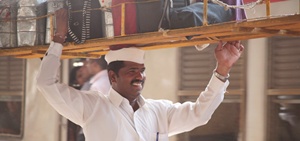Flipkart ties up with Mumbai dabbawalas for last-mile delivery
10 Apr 2015
Mumbai's efficient 'dabbawalla' system for delivering home-cooked lunch to one's workplace has won global fame, with the well-organised body counting Britain's Prince Charles virtually as a patron.

Now, India's biggest and most ambitious e-retailer Flipkart has tapped into this widespread and relatively cheap delivery system, unparalleled elsewhere in India and non-existent abroad. The home-grown online marketplace on Thursday announced that it has tied up with the 'Dabbawala' organisation for last mile delivery to Mumbai buyers.
It is also experimenting with a crowd-sourced delivery model that will connect local sellers and buyers with the help of voluntary delivery personnel, reducing delivery time.
The move comes as Flipkart faces growing competition from firms such as Snapdeal and the Amazon, who are ramping up their logistics and delivery network to build last-mile delivery channels.
''Dabbawalas have been in the profession of transporting lunch boxes with absolute precision for more than 120 years. They are a huge inspiration on how to conduct business without any paper or administrative back-up to keep the costs down,'' the Bangalore-based firm said in a statement, adding that it firm has partnered with one union of the dabbawalas.
A fact seldom publicised is that the 'dabbawalas', for all their efficiency, are highly unionised. They break up any non-Marathi delivery system before it starts, and frequently take off on mass leave for one minor Maharashtrian festival or the other.
As a partner to eKart, the dabbawalas will initially collect Flipkart marketplace shipments from the delivery hubs and deliver it to customers while picking their dabbas or tiffin-boxes, the firm said.
At present, the delivery person who will be part of this pilot project will be involved in the last-mile delivery and will not communicate with either the seller or merchant.
''The first batch of Dabbawalas have undergone training at Flipkart's delivery centres. At this stage, they will be using a paper-based tracking system with the idea being to gradually train them on the usage of apps and other wearable tech,'' the Flipkart statement said.
Flipkart's crowd-sourcing model has delivery personnel on a specialised delivery programme, post extensive background verifications, and they are free to take up deliveries as per their convenience, the firm said.
It will reduce the delivery process by enabling these personnel to directly collect the package from the local seller and deliver it to the buyer, a step that will reduce order to delivery time to three or four hours.
At present the pilot is operational in Bangalore and the service is currently available for shipments of less than Rs5,000 value.




















